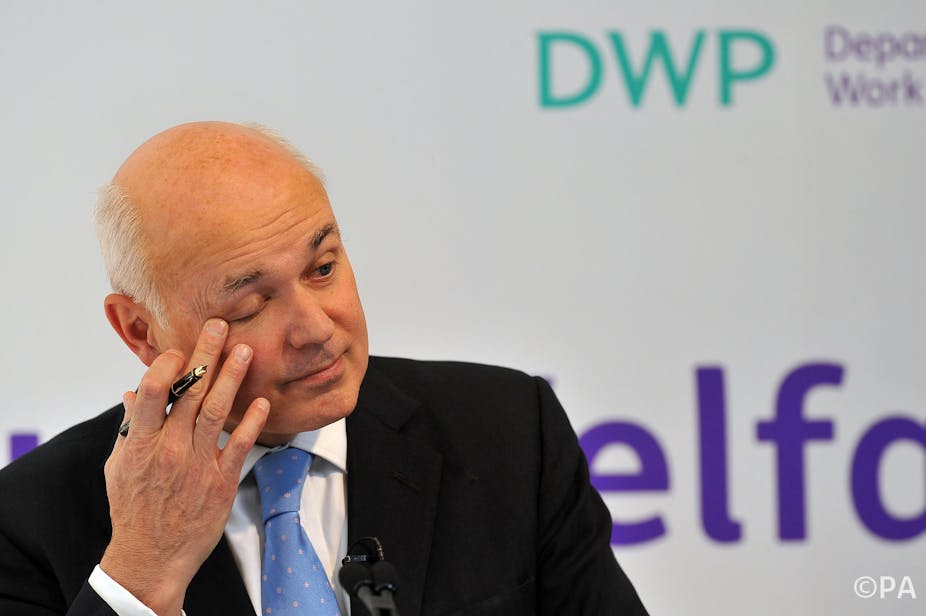Welfare reform and its implementation has been a crucial test for the Conservative Party’s rebrand. Since returning to government in 2010, it has made concerted efforts to discard its nasty party image and has sought to revive its more compassionate “one nation” heritage. The resignation of Iain Duncan Smith as Work and Pensions Secretary has thrown this strategy into question.
In a parting blow, he criticised the government for being too intent on cutting the deficit with welfare cuts that are going too far. Reforms to disability benefits were the straw that broke the camel’s back for Duncan Smith and precipitated his resignation. But what about the numerous cuts that preceded this policy to save £4 billion by 2020-21?
Universal credit
Top of the Conservative Party’s agenda has been eliminating the national deficit, with numerous savings being found in the welfare budget.
Duncan Smith’s flagship policy was the universal credit initiative. The move to streamline a whole range of welfare benefits into a single payment seemed logical, as it saved both costs and administrative effort in the process.
There have, however, been some major problems with implementing universal credit. Launched in October 2013, it has so far been rolled out to just 203,000 people, all of whom are single men without dependents. Where it has been trialled, there have been both late payments and under-payments. It has also created some major practical difficulties, for example where housing benefit has been paid straight to tenants, who prioritised it for other essentials and generated further personal debt, rather than landlords.

Supporters say the policy ultimately will instil greater individual responsibility into the UK’s welfare system. But critics have argued that its key consequence has been to further disincentivise and impoverish those reliant on the welfare state within the poorest sections of society.
Either way, it is becoming apparent that the scheme is facing some major problems and has not materialised as envisaged nor on schedule.
The welfare cap
The so-called “welfare cap” was a deliberate byproduct of the highly significant Welfare Reform Act, a law passed in 2012. It imposed a limit on the amount of benefits that any family could claim, which from April 2017 will be £23,000 – or approximately £440 a week – in London and £20,000 in the rest of the UK. Since resigning, Duncan Smith has criticised the cap as arbitrary.
The cap seemed to have public support, yet it did generate further hardship for some genuine cases and there are questions over how much it really has saved.
Work Programme
A central idea that has underpinned the Conservative Party’s welfare reform is the idea that nobody should be better off on benefits than they would be in work. So the logical next step for those experiencing the financial pinch of benefits reform, is that they are helped to find work. Cue the Work Programme, which was introduced in 2011 and was targeted at older workers and the longer-term unemployed.
This much-heralded policy has been criticised for forcing welfare recipients to work in often inappropriate situations or lose their welfare payments (referred to as “workfare”). In late 2015, the Commons Work and Pensions Select Committee criticised the fact that 70% of those enrolled on it have failed to find long-term employment. But it is deemed to have produced the same results as previous programmes at a greatly reduced cost.
Bedroom tax
But what of the much-maligned bedroom tax or, as the government would rather you call it, the spare room subsidy? Introduced in 2012, it has sought to address the spiralling housing benefit bill and has reduced housing benefit payments for those deemed to live in houses too big for the size of their family.
But the apparent inflexibility of the policy to acknowledge specific individual circumstances has generated a raft of criticism and some tragic stories of vulnerable people suffering as a result.
Tax credits and the living wage
The Conservatives also tried to reform tax credits. Plans to cut £4.4 billion in tax credits were scrapped after an embarrassing defeat in the House of Lords in October 2015. An improvement in public finances at the time of the Autumn Statement enabled the chancellor to ditch the cut.
These cuts may yet still occur and, in the meantime, the Cameron government is proposing a national living wage as a further means to entice people away from the benefits culture.
And finally … disability cuts
The u-turn on the £4.4 billion tax credit cut appears to have contributed to a financial hole Osborne has had to fill. The latest budget proposed £4 billion of reductions to the already diminished welfare budget for the disabled. This has had toxic implications for the party’s image, and for Iain Duncan Smith it appears to have been a cut too far.
His mission was to streamline welfare spending, but still protect the long-term prospects of the most vulnerable. And, in resigning, Duncan Smith has played up his commitment to compassionate conservativism. Yet his record shows he oversaw numerous cuts in what was a chequered record at the Department of Work and Pensions.
Regardless of the motives for his dramatic resignation, this latest eruption highlights the ongoing difficulties of addressing the ever-growing welfare bill of an ageing and expanding population, especially alongside a commitment to cut the deficit. It also questions the Conservative Party’s repeated claim that “We’re all in this together”.

